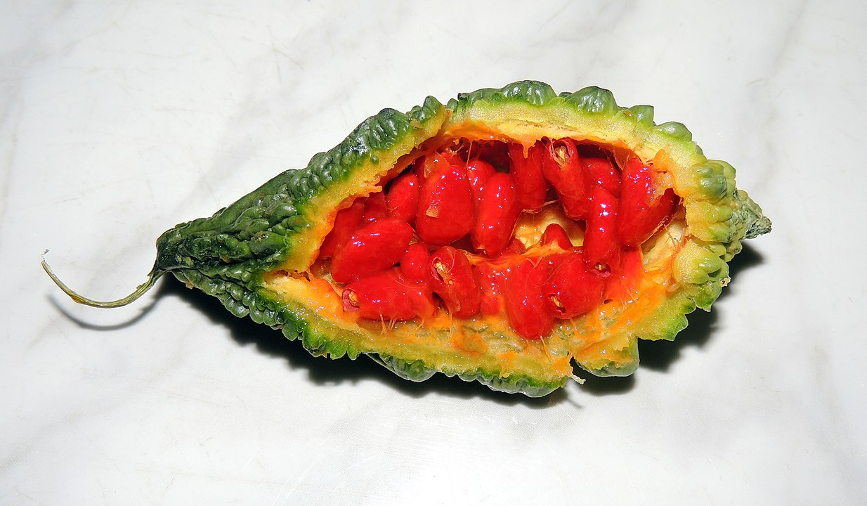I am feeling rather awkward, standing in line in the narrow dirt walkway between two raised beds inside a hoop house, when the young woman in front of me turns to ask, ‘excuse me, were you two just speaking in Bangla?’
‘Yes, we were,’ I reply, startled that this stranger would know. My husband and I are at a seed swap, a social event for gardeners to mingle and share extra seeds. But unexpected rain has forced us indoors into a compact hoop house, which is basically a poor man’s greenhouse: plastic stretched over steel hoops. It’s early spring, and the raised beds that run the length of the hoop house not yet planted with cold hardy greens. As on any farm, every inch of hoop house space is precious. Spring greens mean food and money, so the beds are generously wide while walkways are minimized to V-shaped furrows. In the central furrow where weeds sprout in clumps, my husband and I stand in line with a half dozen others, waiting to get to the tables of free seeds arranged over the beds. It’s hard to even turn, let alone mingle, hence the awkwardness. It’s an unlikely place to meet a fellow Bangladeshi.
‘I am half Bangladeshi,’ she clarifies, ‘from my father’s side. I know, I don’t look it.’
She doesn’t. It’s more than her features, which I would have called Latina. It’s the way she stands her ground, slender and graceful like a dancer.
The line moves at a slow shuffle. Ahead of us, attendees pepper the organizers with garden questions and sift through seed packs. No one ever hurries through a seed swap, so my husband and I are happy to pass the time making a new friend.
‘I am Fatema,’ she introduces herself. ‘My parents are in Connecticut, but I live in Providence. My dad’s sister and her husband live in Cranston. Do you know…?’
We exchange names of Bangladeshis we know, laughing as we try to find a mutual acquaintance and guess if we are talking about the same person. She is friendly and inquisitive with none of the hesitancy that often crops up between first and second generation Bangladeshi Americans, especially between age divides.
It’s because I’m not like most of those other Bangladeshi ‘aunties’. I pride myself in not being nosy and judgy, like trying to figure out if she’s here with a boyfriend.
‘Did you say you are teaching?’ My husband asks her as the line inches forward, always the practical one.
‘It’s just a filler – gardening for kids – while I try to figure out what to do. I studied architecture. I worked a few years…but I’m not sure if it’s right for me.’
‘She’s an architect,’ my husband says, pointing to me.
‘Was, a long time ago,’ I correct him while marveling at the coincidence. ‘I quit because it never felt right.’
Where I am standing feels right, despite being wedged in. The beds on either side are too wide to step over but just right to maximize efficiency. I wouldn’t dream of stepping on the soil; it would compact their carefully managed tilth. Odd lengths of lumber span the overhead trusses; they will support rows of wires – after the greens are harvested – to hold up a crop of tomatoes. Hot house tomatoes – that’s what I’d grow if I had a hoop house. I covet one, like a teen covets a car. I tip my head and inhale the moist, umami scent of waiting earth and rotting baseboard. My husband fidgets.
‘I have a market garden,’ I tell Fatema, ‘which is a like a one person farm.’
‘Wow,’ her eyes light up. She’s a gardener and volunteer on community projects. She confides in me, ‘I want to be a farmer, but it’s hard to explain to family, isn’t it?’
I know it is. I feel protective of her. She’s mini-me, just smarter. I tell her that.
‘A good thing you know what you want while still young. I was late to the gate.’
We discover more similarities, such as a dread of the corporate workspace, a late blooming love of fried bitter melon. My brain splits in two. One half stays in the present while the other starts to flip through a rolodex, to remember if any Bangladeshi friends are on the lookout for a girl for their son or nephew.
I realize I am turning into my mother.
I have often wondered if reincarnation is actually that curious mid-life phenomenon whereby a person – after decades of youthful non-conformity – overnight turns into their parent. Suddenly they are anxious and unhappy, and convinced the next generation is going to ruin. They become worriers and what-ifers. I see it happen to cousins, friends. Now I’m thinking like a matchmaking auntie of my mother’s generation. Yikes.
A burst of goodbyes interrupts my mortified reverie. A group of people exit through a door in the far wall whose plywood inside is adorned with a line of rusting tools – treasured heirlooms from a hand-powered past. The line lurches forward. We reach the seed table and my husband sighs in relief. The moment of connection ends.
But I don’t want to let go.
‘I’ll have bitter melon seedlings in June. Would you like to pick some up?’ I blurt out.
‘I’d love some!’ Fatema says. ‘Thank you auntie.’
‘Call me.’ I write my number on a seed pack rattling with the sweet promise of renewal.
Teaser photo credit: By Mayeenul Islam – Own work, CC BY-SA 3.0, https://commons.wikimedia.org/w/index.php?curid=23472349





